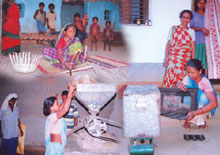Establishment of micro enterprise models
 Five enterprises were identified and given a fillip through SHGs for which ICPRD provided the technical skills and expertise along with a start up capital. The poor and tribal women of the project area used locally available resources and cost-effective techniques to develop these replicable enterprise models. (Five enterprise models developed as best practices: Five model micro enterprises have been developed for replication: These are: Bakery, Vermi-compost, Sattu making, Fish farming and Silk cocoon rearing). The exposure visits used these as best practices due to the efforts of the current project. In fact, this is the first time that local micro entrepreneurship models have been given a fillip. Thus indicating systematic best practices in entrepreneurship are potential and possible by poor women in these remote areas. Five enterprises were identified and given a fillip through SHGs for which ICPRD provided the technical skills and expertise along with a start up capital. The poor and tribal women of the project area used locally available resources and cost-effective techniques to develop these replicable enterprise models. (Five enterprise models developed as best practices: Five model micro enterprises have been developed for replication: These are: Bakery, Vermi-compost, Sattu making, Fish farming and Silk cocoon rearing). The exposure visits used these as best practices due to the efforts of the current project. In fact, this is the first time that local micro entrepreneurship models have been given a fillip. Thus indicating systematic best practices in entrepreneurship are potential and possible by poor women in these remote areas.
These are:
I. Cake-Doughnut Business Model
II. Vermi Compost Activity as Micro Enterprise Model
III. Sattu Project (flour made from a type of gram called ‘chana’) as Micro Enterprise Model
IV. Coocoon (silk worm) Rearing
V. Fish Farming
- Vermi Compost Activity as Micro Enterprise Model
Name of NGO |
Lokdeep |
Name of Self-Help Group |
Ankur SHG |
Ankur SHG is a group consisting of 12 members. These members belong to SC tribal community of Narayanpur village. In Narayanpur, most of the families keep cattle (cows and buffaloes) and animal husbandry contributes around 30-40% in their annual income.
Weekly meetings at regular intervals with 90-100% attendance, saving and repayment take place in this SHG on Saturdays at 12 pm. All the members save Rs. 5 weekly (monthly Rs. 20). Members take loans for fodder and cattle purchase apart from taking loans for consumption and health purposes.
Members of Ankur SHG attended a training and demonstration workshop on vermi compost by KVK and Aatma (Govt. Programme) in Dumka. The participants were given samples of 2.5 kg. of worms and 10 kg. of vermin compost. They applied this 10 kg. sample in the flower gardens in their courtyards and saw the difference with an augmentation in the number, size and brightness of marigold flowers. The worms were fed on cattle dung after making beds on soil under free shades. They covered the beds with straw, banana leaves, and sprayed water for moisture, whenever needed. More compost was ready within 25-30 days in the upper portion of the beds and they applied this compost in the fields and found the difference in the production of wheat and vegetables.
With financial assistance from ICPRD, the members are able to augment this exercise. The members have maintained the beds well. Now they have more worms as their number has increased. 250 kg. of compost has been applied in paddy fields and members are happy with the quality of crops in their fields and are selling it at Rs. 3.5 a kg. They are saving on money spent on fertilizers, and there is a bonding in the community as members from different castes are working together.
Name of NGO |
Prabla, Jamtara |
Name of Self-Help Group |
Sangyoti |
| Village |
Rasiyabhirha, Jamtara |
| No. of Members |
12 |
There are several small lakes and ponds in and around the village which have fish. The village folk catch these for consumption and for sale in the market. Prabla NGO provided training to the members of Sangyoti SHG through a professional trainer. The members learnt how to nurture fish – food and medicines, etc. On completion of the training, a pond was taken on lease under the supervision of the professional trainer. Under the terms of the contract, each member was to receive equal share from profits earned. A loan of Rs. 1,700/- was taken from the group.
Cost Price |
Selling Price |
.Lease Amount |
Rs. 200/- |
350 kg fish x Rs. 40/- per kg = Rs. 14,000 |
| Food for Fish |
1,600/- |
|
| Miscellaneous |
300/- |
|
| Total |
2,100/- |
|
Rs. 14,000 - Rs. 2,100 = Rs. 11,900/- Profit |
The group desired to expand its business as the pond had the capacity of nurturing 4,000 kg. fish over a period of one year. But they needed funds to do so. With monetary assistance from ICPRD they have been able to purchase 5,000 fish seed which will give them a return of 4,000 kg of fish (some seeds not maturing) within a year giving the group a profit of Indian Rs. 1,48,250/-.
The group faces the problem of buying fish food. There are government outlets for fish food but these are expensive and at the same time not available when needed.
The group has also given an application for advanced training at the Government Research Centre. ICPRD is looking into these problems of the group as well and working towards a possible support in this regard.
<<PREVIOUS NEXT >>
|



